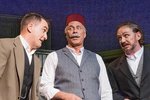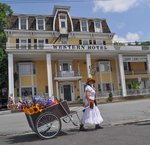 Narrowsburg
NarrowsburgLight Rain Fog/Mist, 43°
Wind: 8.1 mph
 Narrowsburg
NarrowsburgI’m pretty sure that William Shakespeare wrote those very words in his play “Twelfth Night,” but I’m too lazy to look it up and don’t want to bore you with the details. …
Stay informed about your community and support local independent journalism.
Subscribe to The River Reporter today. click here
This item is available in full to subscribers.
Please log in to continue |


I’m pretty sure that William Shakespeare wrote those very words in his play “Twelfth Night,” but I’m too lazy to look it up and don’t want to bore you with the details. What I will share is that a passion for music (and opera in particular) was never more evident than at the Tusten Theatre in Narrowsburg, NY last Saturday night. As I took my seat and scanned the program, Delaware Valley Opera (DVO) artistic director Carol Castel’s notes struck a chord.
“I agree with Richard Strauss,” she wrote. “Music is the holiest art.” Castel goes on to say that “The operatic form spotlights the expression and that special vulnerability of the human voice which, like all live music, is heard not only aurally but viscerally.”
If you’re still reading this, I have to assume that I didn’t lose you at the word “opera” and I may continue. This season, the DVO has chosen to open with lighter fare, in the form of two one-acts, one written by the prolific team of Gilbert and Sullivan, who together wrote more than a dozen comic opera’s over 100 years ago, and one whose music was written by one half of that team, Arthur Sullivan. “I thought the word was ‘operetta,’” I mumbled under my breath, but couldn’t find that word in Castel’s program notes, so I looked it up before the lights went down and phones had to be silenced. “A short opera,” the dictionary stated, “usually of humorous theme and having spoken dialog. Notable composers include Johann Strauss (hmmm) and Gilbert and Sullivan.” Huzzah!
Returning to the program and Castel’s comments regarding the opera company’s 32nd season, her sentiments addressed what many of us think. “Some say opera is an elite form. Well, if by that they mean it’s not for everybody, I agree,” she writes. “But Gilbert and Sullivan?” I thought. That’s a horse of a different color. The two one-acts in question—“Cox and Box” and “Trial By Jury”—are both short and sweet, and as promised, quite funny, in an old-timey-but-yes-it’s-still-opera kinda way, and this production, playing through next weekend, is (IMHO) kinda delightful.
Even though it is written in English, “Cox and Box” contains words ( ‘Rataplan,” “Dodger,” “Watteau”) that we in the 21st century might be unfamiliar with but that the DVO has kindly defined in the “Gilbertian Glossary” provided in the program, which I referred to constantly, wanting to get the names right, as I scribbled notes to myself. Arthur Sullivan wrote the music and F.C. Burnand, rather than W.S. Gilbert, wrote the libretto. Baritone Bryan Elsesser (Cox), tenor Nicholas Wuehrmann (Box), and bass Ken Parks (Bouncer) have impressive voices well suited to the material, and all three have comic timing to boot. If forced to single out anyone, it would be Elsesser, who clearly not only has a passion for the material, but also a firm grip on comedic flair. The packed house laughed out loud as he pranced about the stage in perfect operetta foppishness as the ridiculously farcical plot unfolded on Parks’ nice (but wobbly) set.
Fortunately, his set design for “Trial By Jury” was more stable, since the cast is much larger (14 in all) and the action, smartly directed by Wuehrmann and Parks is non-stop. I’m still scratching my head over the oddly deliberate update of the second act (cell phones in the courtroom?) and couldn’t quite tell if it was set in 1780 or 1980 (much less fathom why), but soprano Brooke Schooley (the plaintiff), mezzo-soprano Janice Meyerson (counsel for the plaintiff) and Parks are impressive, amusing, and command the stage.
Much of the attention however, goes to tenor Jack Tobey (the defendant) who gambols about the stage, contorting his face in mock horror and amusement mixed with consternation, as Schooley’s plaintiff flirts, accuses and humiliates him in front of the judge, played by glee by Wuehrmann, who has a field day with the role, while clearly enunciating the endless barrage of lightning-fast clever lyrics that Gilbert and Sullivan are known for. In lesser hands, the task might have been too much; but Wuehrmann owns the material, taking the audience with him on a one-act roller-coaster ride. Kudos to everyone involved, but the one name I continually heard being whispered in the halls was that of newcomer Ken Parks, who, it would seem, has breathed new life into the DVO and is being showered with adulation for the countless hours of dedication and inspiration that have in turn elevated the entire company. Bravo!
For tickets and information on the entire DVO season, go to www.delawareval leyopera.org or call 845/887-3083
Comments
No comments on this item Please log in to comment by clicking here